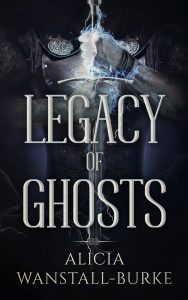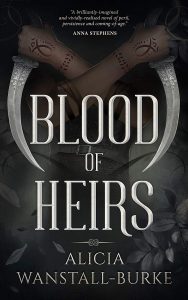LEGACY OF GHOSTS by Alicia Wanstall-Burke (Book Review)
 Blood of Heirs, Alicia Wanstall-Burke’s debut, introduced us to two leading characters at opposite ends of a vividly drawn world. Though Lidan the southern princess and Ranoth the Northern prince never met in that first book, they faced a common foe. Ranoth’s people called them Dradur, Lidan’s called them Ngaru, but either way these were formidable creatures fashioned from corpses fitted with embedded blades and bred for ferocity.
Blood of Heirs, Alicia Wanstall-Burke’s debut, introduced us to two leading characters at opposite ends of a vividly drawn world. Though Lidan the southern princess and Ranoth the Northern prince never met in that first book, they faced a common foe. Ranoth’s people called them Dradur, Lidan’s called them Ngaru, but either way these were formidable creatures fashioned from corpses fitted with embedded blades and bred for ferocity.
Lidan and Ranoth also faced separate, more domestic perils: the ruthless ambition of Lidan’s mother to see her daughter succeed to clan leadership at any price, and the granite intransigence of Ranoth’s father who would see his only son executed for the crime of being gifted with magic.
The first book ended with the protagonists each earning themselves some breathing space. Ranoth had escaped to a refuge where users of magic could live and learn and share their gifts. Lidan had navigated the complications of a war between the clans and a family tragedy to force her mother into an uneasy truce, a pause in her murderous ambition. That hiatus would allow Lidan to find another way to keep all her family safe.
Legacy of Ghosts opens four years after the events of Blood of Heirs – a time during which the protagonists have not been idle.
Lidan has become one of her father’s rangers, roaming the plains around her home to battle enemy clansmen and Ngaru incursions. The nomadic warrior life has helped her form a close bond with her fellow scouts, while also revelling in the independence and distance from her own mother Sellan and Sellan’s frightening companion the enigmatic crone.
Ranoth – hiding his princely blood – has lived in a homely internment within the Keep, one of many respected magic wielders within the community training the young but with no scope to leave or seek redress for the injustices he has suffered.
Wanstall-Burke’s titles are curtly cryptic yet – as each story unfolds – clearly logical. In Blood of Heirs it was the curse of their inheritances that shaped Lidan and Ranoth’s paths. In this volume, they are each haunted by a personal ghost, spirits of beings slaughtered by magic with a hunger for vengeance that they bequeath to our protagonists.
A collision of circumstances, tragedy and desperation shakes Ranoth free from his sojourn in the Keep and drives him south. He travels with a few close companions in pursuit of justice for his ghost, retribution for the Keep, and a faint chance of familial rehabilitation for himself.
Lidan’s busy but happy time with her fellow rangers is also under threat. Even the most tight-knit, well-trained soldiers will have a few with an exaggerated sense of their own worth and rights – the kind of tension that invites peril and inspires bloody arguments. In the aftermath, Lidan’s seemingly simple pleasures and desires become subjugated in a tangled web of clan law and inter-clan diplomacy.
Vivid descriptions are a strength of Wanstall-Burke’s prose:
The cliffs rose either side, bluffs of orange and white cresting the tops like great stone waves held frozen in time.
[The mountains] dominated the space on the vellum sheet, as if the spine of the world had broken the surface of Corraidia and arched its bare bones towards the sky.
The writing is also illuminated with flashes of humour, such as when Lidan’s mother is thwarted:
Sellan took Erlon’s announcement with all the grace and composure of a cat dunked in a rain barrel.
Or when Ran is discussing a suspected dragon attack:
Aellish threw her hands out exasperated. “I don’t know! I wasn’t here! But by the fucking great big bite marks on the side of the wagons and the serious lack of corpses, I’d say they were probably involved.”
But Wanstall-Burke has the knack of mixing visceral humour and tragic introspection such that each throws the other into sharper relief and gives depth to the depiction of very human lives, not least when Lidan reflects on grief or is tortured by an experience of pain that must draw deeply from the well of the author’s own experience.
That gurgling gasp was always loudest in the quiet moments, when her mind emptied and thoughts faded and little purpose gifted her too much time and space to think. Only when she stared down the shaft of an arrow, the sounds of her sister’s death fled, and for a moment as brief as a few heartbeats nothing else existed.
Pain did that. Unrelenting, merciless pain. It sucked the light from your soul, devoured your joy, and ravaged any strength held in reserve.
Legacy of Ghosts is haunted by magic: the magic that Ranoth has bursting within him that he must struggle to control; the magic that binds the dradur/ngaru to this world and their own unknowable destiny. Wanstall-Burke brings an inventiveness to her world’s magic that is not simply about power-blasting problems aside (though it does have moments like that). Those users of magic have different talents, partly a form of energy, partly a kind of sight. Ran’s ability to see the invisible thamalux trails left by those gifted – or tainted – by magic is a key driver for moving the story onwards and southwards.
 However, magic is no simple or inexhaustible solution to the problems that befall them. There are times when Ran is crippled by his own magic, or utterly drained of it, and this makes an intriguing counterpoint to Lidan and the Tolak clan. Lidan’s clan, having less use and more suspicion of magic, and indeed less access to raw steel, have had to use brute force and skill to defeat their foes. In so doing they have become very accomplished warriors, capable of taking down Ngaru that could have, would have, and indeed have, shredded forces in the far north. But no victory is ever permanent or certain, especially when betrayal and intrigue infect the clans.
However, magic is no simple or inexhaustible solution to the problems that befall them. There are times when Ran is crippled by his own magic, or utterly drained of it, and this makes an intriguing counterpoint to Lidan and the Tolak clan. Lidan’s clan, having less use and more suspicion of magic, and indeed less access to raw steel, have had to use brute force and skill to defeat their foes. In so doing they have become very accomplished warriors, capable of taking down Ngaru that could have, would have, and indeed have, shredded forces in the far north. But no victory is ever permanent or certain, especially when betrayal and intrigue infect the clans.
Along the way Lidan tiptoes uncertainly towards a romance as enticing as it is inappropriate. The relationship is a subtle, slow-burning affair that complements without overpowering the main threads of Lidan’s story. Ran’s most intimate friendship, however, is with the ghost of a girl whose mortal remains were turned into a Dradur. Her soul infects his own and drags him into strange white spaces, silent conversations and life-changing oaths.
Like Lidan and Ran themselves, the plot of Legacy of Ghosts ranges widely, sequences of events forming a trail of actions and consequences. The tight focus on Ran’s journey and Lidan’s travails takes us away from events and characters in the North, but the book’s ending promises a return there in the next volume for a final reckoning.
The threads that bind the Ngaru or Dradur to their creators draw Ran and Lidan inexorably closer together, building to a moment of recognition as startling though not quite as genteel as Stanley’s “Dr Livingstone, I presume.” In the aftermath of that revelation they are forced to fit their differing skills and powers into effective collaboration. But even that cannot forestall a moment where old, cold secrets emerge ferociously into explosive day-lit scrutiny.
LEGACY OF GHOSTS (Coraidic Sagas #2) will be released on November 30th 2019. You can pre-order it here.

